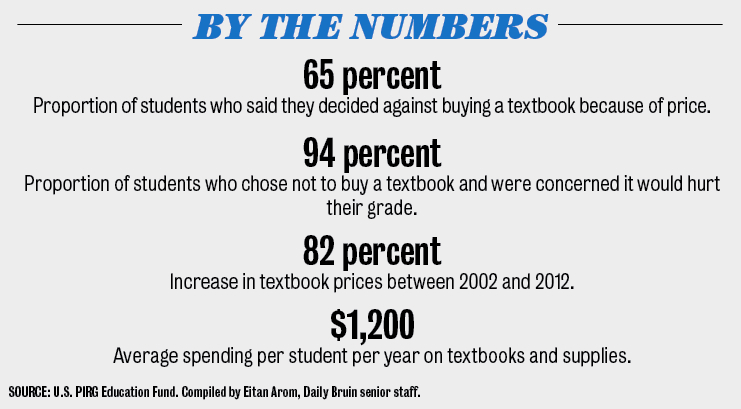This quarter alone Kendal Drucker’s three textbooks cost her almost $400.
Drucker, a second-year psychology student, is involved in the California Public Interest Research Group, or CALPIRG, which is working to get professors at UCLA to join a movement toward open-source textbooks and other affordable online course materials

With the costs of textbooks rising, open-source course materials, or resources made available cheaply and digitally, are an imperative for UCLA. CALPIRG’s goal at this school is to get an entire department to commit to working with open-source materials. UCLA should look into providing larger budgets and more institutional manpower to facilitate this type of effort.
Last year, the UCLA Library started the Affordable Course Materials Initiative, providing funding to faculty who offer their students more affordable options for course materials.
Diana King, the film, television and theater librarian at UCLA, is part of that effort. This fall, King worked with David Gorshein, a lecturer in the UCLA School of Theater, Film and Television, to find more affordable course materials for an undergraduate theater class he was teaching.
Gorshein applied and received funding from the Affordable Course Materials Initiative. With King’s help, Gorshein found some of the plays he required online and dispensed with a textbook requirement that would have cost students more than $100, instead opting to make the two chapters of the textbook he used available electronically.
The lack of broad-reaching infrastructure at UCLA to support open-source efforts beyond the Library’s initiative is inhibiting the ability of all faculty members to get access to affordable materials.
With more institutional support, Gorshein’s example can be applied to more and more classrooms and students on this campus.
The push now is on course materials in the sciences, where expensive entry-level textbooks cut into underclassmen’s budgets.
Professor Troy Carter, who teaches Physics 1B: “Physics for Scientists and Engineers: Oscillations, Waves, Electric and Magnetic Fields,” recognizes that textbooks for the science, technology, engineering and mathematics fields can be pricey. Even a used version of the mandatory book he uses for the class costs more than $150 at the UCLA Store.
Both King and Carter believe that more infrastructure and support need to be built for faculty to pursue more affordable course material options.
For the 2013-2014 academic year, the initiative had a budget of $10,000. While this is a start, UCLA should commit to supplying more support to programs that help professors navigate the time-consuming process of revising course materials to find online equivalents.
A report released last week by the U.S. Public Interest Research Group, the parent organization of CALPIRG, illustrates the need to expand these programs.
Of the 2,039 students from 150 different universities who were surveyed by the study,65 percent said cost prevented them from buying textbooks they needed, and 94 percent of those who didn’t buy textbooks because of cost were worried about the effect this would have on their grades.
Which leads to the main solution offered by the report: open-source textbooks.
The university can help make this goal tangible by pairing faculty with experts knowledgeable about copyright laws and licensing information, who can help construct new and improved syllabuses that make use of more online options.
Those experts are already in residence here at UCLA. For instance, the UCLA Library’s Scholarly Communication and Licensing unit works toward educating the campus about what affordable materials are legally accessible to students, among other efforts.
The efforts of groups like this one can have real fiscal results. The U.S. PIRG study reports that “If every student at the University of Wisconsin-Madison were assigned just one open textbook each semester, it would generate over $6 million in student savings in just one year.”
The savings at the University of Wisconsin-Madison would amount to about $200 per undergraduate student each year, small fries when compared to inflated tuition but still a huge sum when multiplied by the number of students that could be affected. Given that UCLA’s enrollment is only about a thousand less than that of the University of Wisconsin-Madison, the impact at UCLA could be equally significant.
Putting the full force of UCLA’s research and education apparatus behind the move toward affordable course materials can help students here, and also help make cheap textbooks a reality nationwide.
Given the incredible bevy of online course materials, students should not be making difficult decisions when it comes to purchasing textbooks. UCLA has the opportunity to make this decision a no-brainer.
Send general comments to opinion@media.ucla.edu or tweet us @DBOpinion.
